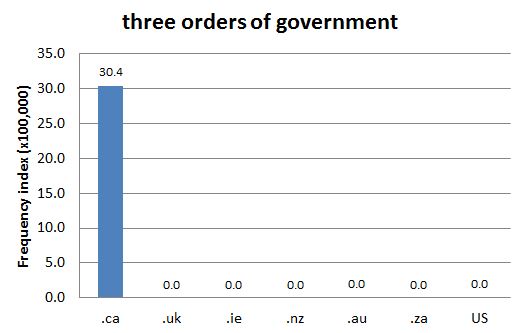DCHP-2
three orders of government DCHP-2 (July 2016)
1 expression — Administration, Politics
referring to the federal, provincial/territorial and municipal governments together.
Type: 5. Frequency — The three orders of government are the federal, provincial and municipal levels of government, also often called the "three levels of government" (see second Parliament of Canada reference). They constitute a division of power among the government and lead to stated distributions of responsibility throughout the system (see the 2006 quotation). The three orders of government are essential to the system of Canadian federalism and the terminology is not only most frequent in Canada (see Chart 1), but also has considerable cultural-political salience.2 expression — Politics, First Nations
the idea that beyond federal, provincial/territorial and municipal governments, an independent level of Aboriginal governments, a second third level, is to be respected.
Type: 4. Culturally Significant — The term can also refer to the federal, provincial and Aboriginal levels of government (see the 1992 quotations). This meaning gained currency after its inclusion in section 35.1 (2) of the failed 1992 Charlottetown Accord, when "government and Aboriginal leaders agreed to a third order of government in Canada" (see the 1994 quotation); Aboriginal governments would thus be of an equal, not subordinate, status to the federal and provincial governments (Webber 1994: 170). The three orders of government are intricately linked to the right to self-government (see self-government), as this right is supposed to be interpreted "in a manner consistent with the recognition of the governments of Aboriginal peoples of Canada [as] constituting one of three orders of government" (see Canadian Encyclopedia, s.v. "Charlottetown Accord: Document"). Thus, the acknowledgement of Aboriginal governments in this document, though it was not legally ratified by all parties and thus failed, as one of the three orders of government acts as the foundation for self-government in Canada (see the first Parliament of Canada reference).
As noted by the 1996 Royal Commission of Aboriginal Peoples Report, "the three orders are autonomous within their own spheres of jurisdiction, thus sharing the sovereignty of Canada as a whole. Aboriginal governments are therefore not like municipal governments, which exercise powers delegated from provincial and territorial governments [...]. Canadian governments are coming gradually to accept the idea of shared sovereignty and Aboriginal self-government" (see AANDC reference).See also: sovereignty (meaning 2) self-government
References:
- AANDC "Highlights from the Report of the Royal Commission on Aboriginal Peoples: People to People, Nation Accessed 14 May 2014
- Canadian Encyclopedia s.v. "Charlottetown Accord: Document" Accessed 18 May 2016
- Parliament of Canada "ABORIGINAL SELF-GOVERNMENT" Accessed 12 May 2014
- Parliament of Canada "The Three Levels of Government" Accessed 14 May 2014
- Webber (1994)
Images:
Chart 1: Internet Domain Search, 12 May 2014
